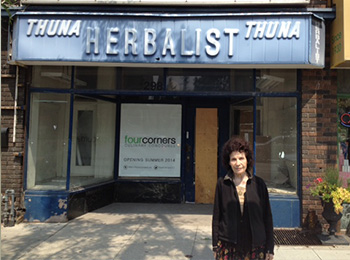Most people retire in their 60s but Evelyn Dorfman, now 90, forged a vibrant second career, and has spent the last three decades contributing to a family business that, until the closing of its storefront on August 2, was long considered a fixture in Toronto’s east end.
Last year, rising rents forced Thuna Herbals, the herbal remedy store that has, in some iteration, been in Dorfman’s family since the late 1900s, and a presence in Toronto since 1922, to move out of the 298 Danforth Ave. space it had inhabited since the late 1920s.
As a temporary measure, Thuna’s owner and Dorfman’s brother, Lionel Pasan, relocated the shop to a shared space with a homeopath across the street, but the arrangement came to an end earlier this month.
Currently, Thuna’s is in the process of transitioning to a Web and phone-based order system, and Dorfman will continue to prepare specialized herbal tea remedies, which will now be shipped to customers, to suit people’s particular ailments.
Like the store itself, Dorfman, mother of three and grandmother to seven, exudes a quiet yet unflagging sense of resilience.
“Of course, until I experience the other, I can only assume I’m going to miss the experience of seeing customers,” she said matter-of-factly, her elfin frame perched nimbly atop a stool at a Danforth café.
“Yes, it will be sad that there can’t be a store setting where people can come in and have personal, one-to-one conversations. But, since we can’t have that, we’ll go to the next step.”
Initially trained as a classical singer, in her late 60s, Dorfman proceeded to run the Danforth and Broadview store that her late parents had operated for decades.
Thuna’s legacy began with Dorfman’s grandfather, Max Herriman Thuna, an osteopath and herbalist who treated patients using both western medicine and herbs in the late 1880s in Austria, before immigrating to North America.
He opened the first Thuna’s in Montreal, and, in 1922, moved to Toronto, where he opened the city’s first incarnation of Thuna Herbals on 436 Queen St. W. He ran it until his death in the late 1930s.
“I remember being taken to visit Grandpa at that store,” Dorfman said. “He was friendly, but very severe-looking. I was two or three at the time.”
Her grandfather’s brother, Jack, opened a second location at the Danforth space, and her parents, both trained herbalists, opened a similar store on Queen Street East.
When Jack eventually moved to Montreal, Dorfman’s parents took over the Danforth store, which, after her father’s death, was taken over by her brother, Lionel, who owns it to this day.
For the past 25 years, Dorfman has largely functioned as the face of Thuna’s, manning the store six days a week and attending to her customers’ various health issues by preparing distinct herbal teas to address the symptoms they describe. She has treated maladies ranging from lactation problems to arthritis to painful menstruation to different types of infections.
According to her son, Peter Dorfman, Thuna’s customers have, over time, included both a loyal base, curious newcomers to herbal medicine and young people seeking natural remedies instead of pharmaceutical drugs.
Customers often hailed from different countries or cultures, particularly those with a strong tradition of herbal medicine.
“A lot of native people who were familiar with herbs would come to Thuna’s,” he said.
“Also, a lot of eastern Europeans, a lot of people from Asia who might have known different herbs but there was still some crossover. Thuna’s has provided a kind of Jewish, European version of herbal medicine.”
From her vantage point, Dorfman said herbalism seems to have grown steadily in popularity since the ‘80s and ‘90s, because “people receive wonderful results, they tell others.”
“People would come in and they weren’t sure if they should be there,” she said. “but they’d drummed up their courage and they would explain to me that they have x issue and is there an herb to fix it? We would tell them, ‘There are herbs that can be applied to such a condition, and if they want to try, it’s a safe way to go.’”
Throughout much of her life, Dorfman has also been an advocate for vegetarianism, and previously ran a volunteer-driven group called Toronto’s Jewish Vegetarian Society.
“How it happened that I was running it, I couldn’t tell you,” she mused. “I don’t remember the details. I remember we would hold meetings and support speakers that came to the city…that was before I was a herbalist. I was a vegetarian and that mattered a lot to me. It still does–there’s a direct connection between growing food and growing herbs.”
Dorfman was careful to stress that she’s never tried to push anyone into becoming a vegetarian or to using herbal medicine, saying, with what is clearly a characteristic pragmatism, “You can’t get the quality of response if people have been pushed into it. The whole community produces more vegetarians now–non-Jewish as well as Jewish. They are an example to anyone who wants to see [what it’s like]. There will always be others who don’t want to look, and that’s fine too…you really don’t have a choice to do anything in life other than be an example.”
